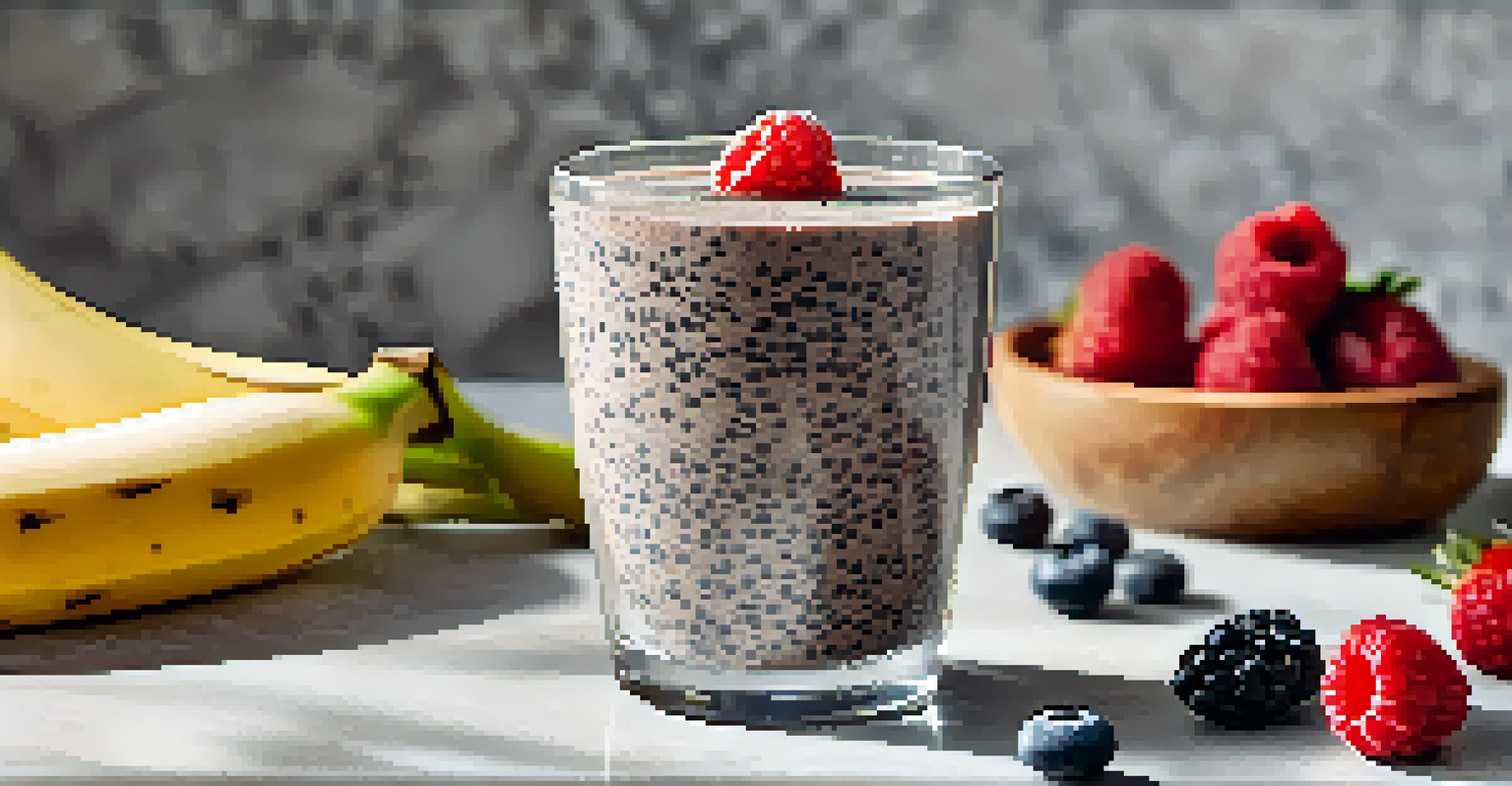Essential Fats: Key Players in a Balanced Vegetarian Diet

Understanding Essential Fats and Their Importance
Essential fats, also known as fatty acids, are crucial for our body's well-being. Unlike other nutrients, our bodies can’t produce these fats on their own, which means we must obtain them through our diet. They play a vital role in numerous bodily functions, including brain health, hormone production, and cellular function.
Let food be thy medicine and medicine be thy food.
There are two primary types of essential fats: omega-3 and omega-6 fatty acids. These fats work in tandem to support heart health, reduce inflammation, and even improve mood. By including these fats in our diet, we not only nourish our bodies but also enhance our overall quality of life.
For vegetarians, understanding these fats is especially important, as they can sometimes be overlooked. Emphasizing the right sources of essential fats can ensure a balanced diet that meets all nutritional needs, helping to maintain energy levels and overall health.
Sources of Omega-3 Fatty Acids for Vegetarians
When it comes to omega-3 fatty acids, vegetarians have several delicious options. Flaxseeds, chia seeds, and walnuts are fantastic sources that can easily be incorporated into meals. For instance, adding chia seeds to your morning smoothie or sprinkling flaxseeds on oatmeal can boost your omega-3 intake significantly.

Another excellent source is algae oil, which is often found in supplement form. This oil mimics the omega-3 found in fish, making it a great alternative for those who don’t consume seafood. Additionally, edamame and hemp seeds are also rich in omega-3s, providing variety in your diet.
Essential Fats Are Vital for Health
Omega-3 and omega-6 fatty acids are crucial for brain health, hormone production, and overall bodily functions.
Incorporating these foods into your meals can help you achieve the recommended daily intake of omega-3 fatty acids. By being mindful of your choices, you can easily create a rich and diverse vegetarian diet that supports your health goals.
The Role of Omega-6 Fatty Acids in a Balanced Diet
Omega-6 fatty acids are essential for health, just like omega-3s. They play a significant role in brain function and normal growth and development. However, it's crucial to maintain the right balance of omega-6s to omega-3s in your diet to avoid potential health issues.
You are what you eat, so don't be fast, cheap, easy, or fake.
Common sources of omega-6 fatty acids include vegetable oils like sunflower, corn, and soybean oil. These oils are often used in cooking and packaged foods, making them readily available. However, it's important to consume them in moderation, as excessive intake can lead to inflammation.
By focusing on whole foods such as nuts, seeds, and avocados, you can optimize your intake of omega-6s while keeping the balance with omega-3s. This approach helps ensure your body receives the full benefits of both types of essential fats.
Balancing Omega-3 and Omega-6 Fatty Acids
Achieving the right balance between omega-3 and omega-6 fatty acids is key to maintaining health. Ideally, the ratio should be closer to 1:1, but many diets skew heavily towards omega-6s, which can lead to health issues. Being mindful of this balance can help optimize overall health.
To balance your intake, focus on incorporating more omega-3-rich foods into your meals while reducing processed foods high in omega-6s. For example, swap vegetable oils for olive oil or avocado oil in your cooking. This small change can make a big difference in your health.
Balance Omega-3 and Omega-6 Intake
Maintaining a proper ratio of omega-3 to omega-6 fatty acids is essential to prevent health issues.
Additionally, consider meal planning to ensure you include a variety of foods that provide both types of fatty acids. By being intentional with your choices, you can enjoy delicious meals while supporting your health with a balanced intake of essential fats.
Incorporating Essential Fats into Your Meals
Incorporating essential fats into your vegetarian meals doesn't have to be complicated. Start by adding a tablespoon of chia seeds or flaxseeds to your smoothies, or sprinkle walnuts onto your salads for a satisfying crunch. These simple additions can elevate your meals while providing essential nutrients.
Another great way to include these fats is through snacks. Consider munching on a handful of mixed nuts or a slice of avocado toast. These snacks not only taste great but also fuel your body with the healthy fats it needs.
Don't forget about cooking! Using olive oil as a base for sautéing vegetables or drizzling it over dishes can enhance flavor while contributing to your essential fat intake. With a little creativity, you can easily create meals that are both enjoyable and nourishing.
Potential Risks of Insufficient Essential Fats
Not getting enough essential fats can lead to several health issues, including dry skin, fatigue, and even mood disorders. Since these fats play a role in hormone production and brain function, insufficient intake can impact your overall well-being. This is why it's essential to prioritize these fats in your diet.
Moreover, a lack of omega-3 fatty acids is associated with increased inflammation, which can lead to chronic diseases such as heart disease and arthritis. This makes it even more critical for vegetarians to be aware of their fat intake and ensure they are consuming enough of these key nutrients.
Incorporate Fats into Your Diet
Adding sources of essential fats like seeds, nuts, and oils can enhance your vegetarian diet and support well-being.
By understanding the risks associated with inadequate essential fat consumption, you can take proactive steps to include them in your diet. This awareness will help you maintain your health and support your body in functioning optimally.
Conclusion: Embracing Essential Fats for a Healthier You
Embracing essential fats in your vegetarian diet is a powerful step towards achieving optimal health. By understanding the importance of omega-3 and omega-6 fatty acids and how to incorporate them into your meals, you can enrich your diet significantly. This not only supports your physical health but also enhances your overall well-being.
Remember that variety is key; aim to include a range of sources for these fats to ensure you're getting the benefits from both omega-3s and omega-6s. With mindful choices and delicious recipes, you can easily achieve a balanced intake.

Incorporating essential fats into your vegetarian lifestyle is not just beneficial; it can also be a delightful culinary adventure. So, get creative in the kitchen and enjoy the journey towards a healthier you!